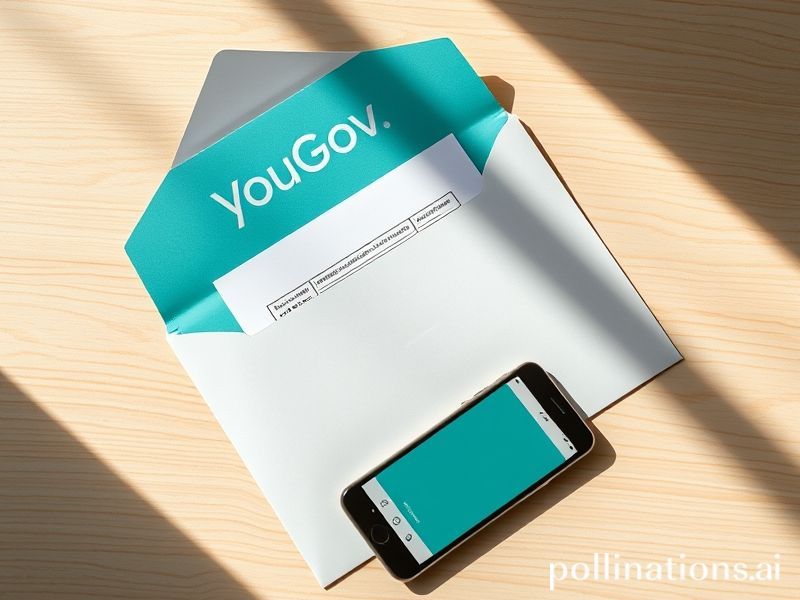YouGov: The British Basement Oracle Selling Your 2 A.M. Secrets Back to the World
A Brit in the Basement Who Knows What You’re Thinking
By Our Man in the Ether, filing from somewhere with shaky Wi-Fi and questionable morals
LONDON—In a city that still pretends the Empire is just having a long smoke break, a modest firm in the unfashionable end of Westminster has quietly become the planetary confessor. YouGov—equal parts polling company, data pimp, and digital bartender—has spent two decades collecting the secrets we whisper into our screens at 2 a.m. and selling the aggregate back to us at retail. From Jakarta to Johannesburg, if you’ve ever clicked “strongly agree” on a survey about pineapple on pizza, chances are YouGov has filed your guilty pleasure under “aspirational cosmopolitan.”
The premise is deliciously simple: ask enough people enough questions, and you’ll know who’ll win the Nigerian election before the ballot ink dries, which South Korean boy band is about to implode, and how many French citizens believe the moon landing was a Bavarian marketing stunt. (Spoiler: 7 %, and they all vote.) The magic sauce is a panel of 24 million self-selected souls across 40-plus countries who’ve traded their opinions for points redeemable for Starbucks cards—capitalism’s answer to indulgences.
Of course, the international implications are profound, if you’re into that sort of thing. YouGov’s quarterly globalism tracker—an index that measures how much we trust foreigners not to steal our jobs or our Wi-Fi—has become the de-facto mood ring for the Davos set. When the needle twitches downward, hedge funds short the peso; when it ticks up, NGOs dust off the press releases about “bridging cultures.” Meanwhile, the algorithm quietly notes that the same Filipino nurse who fears Chinese telecoms also binge-watches Korean dramas. Contradiction is merely another data point, filed under “human, exasperating.”
The darker joke is that YouGov’s real client isn’t the politician or the brand manager—it’s uncertainty itself. In an era when the old oracles (newspapers, grandparents, the IMF) have lost their mystique, a tidy chart titled “What the world thinks” is the closest thing we have to a weather report for the soul. And like any good forecast, it’s most comforting when it’s wrong; we enjoy the shared outrage when the poll misses Brexit or Trump 2016, because it reassures us that humanity is still gloriously unpredictable—even if our browsing history says otherwise.
Yet the reach keeps widening. In India, YouGov’s Marathi-language panel now outnumbers the entire population of Switzerland, which means the next time Zurich wants to know whether teens prefer oat-milk lattes, the answer may come from a farmer in Pune who’s never seen a coffee bean. In Brazil, the company partners with local media to track deforestation opinion in real time—useful data for both Greenpeace and the cattle ranchers who’d like to know exactly how guilty urbanites feel before buying another steak. One country’s conscience is another’s quarterly guidance.
Critics, ever the life of the party, warn that YouGov’s panels skew urban, educated, and terminally online—that is, the demographic most likely to tweet “Eat the rich” between DoorDash orders. The firm counters with weighting algorithms so Byzantine they require their own theology department. Skeptics call it statistical voodoo; supporters call it democracy with a margin of error. Everyone agrees it’s cheaper than an actual election, and slightly more accurate than astrology.
Still, the numbers keep rolling in. Last month, 54 % of global respondents told YouGov the world is “off on the wrong track,” up three points from the last pandemic wave and roughly level with the percentage who believe their government is run by lizards wearing human suits. YouGov does not editorialize; it simply publishes the reptilian consensus.
So here we are, citizens of a planet that outsources its introspection to a British firm operating out of a converted biscuit factory. The polls close every minute of every day, and the exit interview is eternal. If that strikes you as bleak, console yourself with the latest finding: 68 % of humanity thinks things will get better—right after they finish this survey.







